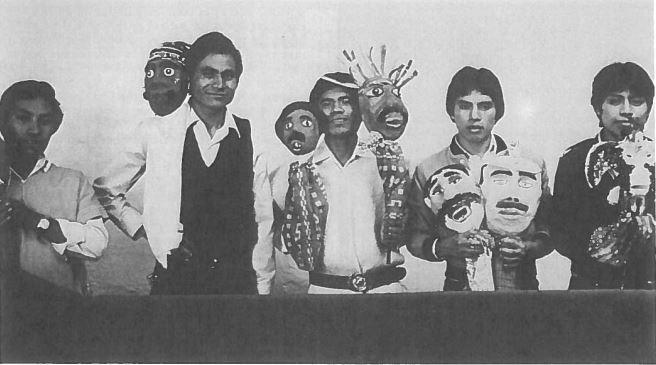1980s: Defending
Then and Now: Cultural Survival Projects and Grants
|
|
CS50: Celebrating 5 Decades of Indigenous Rights and Resilience
Cultural Survival is approaching our 50th anniversary in 2022! We have launched a new annual Giving Day, culminating on June 1, our founding date. We are celebrating five decades of work supporting Indigenous Peoples’ rights and resilience and want to personally thank our donors who have made this work possible.
Your gift to Cultural Survival on June 1 will help us continue advocating for the rights of Indigenous Peoples around the world. We wouldn’t be here without you! |
|
|
Members of the Chiapas Writers’ Cooperative with puppets they use to perform their stories.
|
|
1980s: “Defending” THEN
Chiapas Writers’ Cooperative: A Cultural Survival Project
In the 1980s, Cultural Survival’s field projects assisted groups that were undergoing radical social change and had reached critical crossroads in their social and economic evolution. Projects were selected to maximize such groups' control over economic and social variables so that they were able to make key decisions regarding the future of their communities. Problems addressed by the projects included land rights, natural resource management, legal services, economic development, and cultural studies and promotion. Rather than design projects, Cultural Survival responded to requests for assistance from either Indigenous communities or their regional organizations or support groups.
Sna Jtz’ibajom: The House of the Writer, a Cultural Survival special project started in November 1982, aimed to maintain and revitalize Maya culture in the Mexican state of Chiapas. The writers’ cooperative produced Tzotzil and Tzeltal grammar books for bilingual schools and the adult Maya population. To aid and improve the distribution of publications, the cooperative created a puppet theater and presented shows in which the puppets acted out scenes described in their books. Each writer was trained in making puppets and in presenting puppet shows.
Read More
"In our communities in the Chiapas highlands there are several reasons for promoting the mother tongue, in accord with the beautiful and wise thoughts of the traditional authorities of each one of our communities. It is especially important to record our cultural elements so as to preserve and develop our Tzotzil and Tzeltal Maya culture, to achieve a more just and equitable life for men, women, and children, so that they will be more useful citizens for their town, their state, and their country, capable of successfully confronting the challenges of the future, acquiring at the same time love for their identity, their language, their society, and their ancient culture."
- Diego Méndez Guzmán, president of Sna Jtz’ibajom and Mexico's first Mayan novelist. |
|
1980s: “Defending” NOW
Cultural Survival’s Keepers of the Earth Fund provides small grants designed to support Indigenous Peoples’ community advocacy and development projects. Since 2007, the Fund has provided nearly $2.5 million in grants and technical assistance to over 350 Indigenous-led projects in 64 countries around the world. In March 2018, Cultural Survival was excited to announce 14 recipients of our Free, Prior and Informed Consent (FPIC) and Self-Governance Initiative, totaling $68,112. Read more
 KOEF Grantee: KOEF Grantee:
Ka Kuxtal Much Meyaj A.C. (México)
Atlas of Sacred Sites of Hopelchén
Ka Kuxtal Much Meyaj was founded in 2011 by representatives of nine Mayan communities in Campeche, México, to build the educational, organizational, and agricultural conditions which support Indigenous autonomy. The project will document and map sacred sites, both archaeological and natural, that are of symbolic, religious, or cultural importance to the Maya people and are currently under threat from the soy industry in the community of Hopelchén. The project will use GPS technology to map the sites and record oral testimonies from elders demonstrating the value of these sites as cultural heritage.
|
|
| Nati Garcia (Maya Mam), Indigenous Youth Community Media Fellowship Coordinator |
|
#CS50 #CulturalSurvival50 #1972
|
|
|
|

